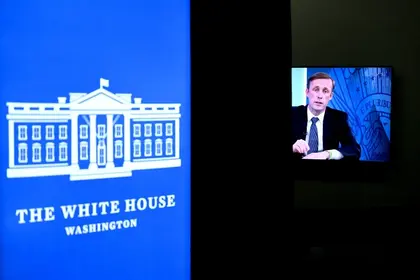President Biden’s senior national security adviser Jake Sullivan has recently held private conversations with top aides to Russian President Vladimir Putin, according to U.S. and allied officials.
According to sources, Mr. Putin’s foreign policy adviser Yuri Ushakov and Mr. Sullivan have spoken on the phone. The officials also stated that Mr. Sullivan had conferred with Nikolai Patrushev, who is his immediate equivalent in Moscow’s administration.
JOIN US ON TELEGRAM
Follow our coverage of the war on the @Kyivpost_official.
The objective, based on the information provided by officials, has not been to discuss ending the conflict in Ukraine, but rather to avoid the possibility of escalation and to maintain lines of communication.
Speaking for the U.S. National Security Council, Adrienne Watson responded, “People claim a lot of things,” when asked if Mr. Sullivan had private meetings with Ushakov or Patrushev. An inquiry for comment from the Kremlin was ignored.
Since Mr. Sullivan spoke with Mr. Patrushev in March, the White House hasn’t made public any phone calls between him and a high ranking Russian official.
The secretive talks occur at a time when conventional political relations between Washington and Moscow are waning and Vladimir Putin and his advisers have suggested they may use nuclear weapons to defend Russian territory, as well as any temporarily occupied gains from this year’s attack on Ukraine.

US Must Address Russian Disinformation to Strengthen US Election Integrity
While other top policymakers believe that talks with Russia in the current diplomatic and military environment wouldn’t be productive, several U.S. officials claimed that Mr. Sullivan is recognized within the government for attempting to push for a point of discussions.
The White House has asserted that retaining some level of communication with Moscow is crucial despite its support for Ukraine and sanctions against Russia for the invasion.
The exact dates and numbers of the calls, as well as a comment concerning their success, were withheld.
Given that relations between the United States and Russia are at their lowest point since the end of the Cold War, some retired American officials contended that it was beneficial for the White House to stay in touch with the Russian government.
In response to this, Ivo Daalder, the American ambassador to NATO during the Obama administration, remarked, “I think it’s always important, especially for nuclear-armed countries, to maintain open channels of communication to help understand what each side is thinking, and thereby avoid the possibility of an accidental confrontation or war.”
He added, “National-security advisers are the closest conduit to the Oval Office without bringing the president directly into that communication channel.”
Throughout his first year in office, President Biden has sought to build a working relationship with Mr. Putin which resulted in a Geneva summit in June 2021. Those discussions included a wide range of topics, including Ukraine where the parties had evident disagreements.
However, by October, U.S. intelligence had revealed that Russian forces were preparing to invade Ukraine. Early in November 2021, CIA Director William Burns was dispatched to Moscow to warn Mr. Putin against an invasion.
While American diplomats were corresponding with their Russian equivalents, Mr. Biden spoke twice with Mr. Putin, in December 2021 and again in February 2022, in an effort to prevent a Russian attack.
Since then, concerns of a nuclear attack have increased.
However, on Thursday, Oct. 27, Russian President Vladimir Putin strongly denied any plans to use nuclear weapons in Ukraine. Instead, he characterized the conflict there as a component of what he claimed are the West’s futile attempts to establish global dominance.
You can also highlight the text and press Ctrl + Enter






